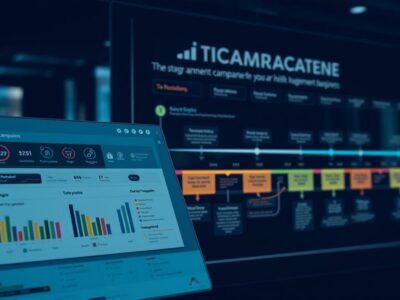In our fast-paced market, using artificial intelligence for lead scoring is key for businesses wanting to boost their sales. With AI, companies can better their lead generation processes by quickly analyzing lots of data. This tech helps find and focus on the leads most likely to buy, raising the chances of making sales. Businesses get to direct their efforts towards the most valuable leads, which greatly improves results.
Key Takeaways
- Implementing artificial intelligence for lead scoring can dramatically enhance sales efficiency.
- AI lead scoring techniques help in identifying high-potential leads faster.
- Integrating AI improves sales conversion rates by focusing efforts on quality leads.
- Understanding data analysis through AI is crucial for effective lead management.
- Utilizing AI tools enables sales teams to maximize their strategic capabilities.
Understanding Lead Scoring and Its Importance
Companies looking to improve sales must get lead scoring basics. This method helps sort leads by their chances to buy. It uses numbers for ranking, making it easier to know who to focus on for better sales results.
What is Lead Scoring?
Lead scoring is a way to figure out which potential customers might buy, using their info and actions. It checks out who they are, how they interact, and their company details. Then, it gives each lead a score that shows how likely they are to become buyers. This lets sales teams concentrate on the most promising leads.
Why is Lead Scoring Crucial for Sales?
Lead scoring is key because it makes sales smoother by highlighting more promising leads. A good scoring system means sales people know where to spend their time well. It speeds up selling and gets marketing and sales working together better, boosting profits.
Key Metrics for Effective Lead Scoring
To do lead scoring right, you need strong measurements. Important ones are:
- Behavioral data, such as website visits and how they interact with content
- Demographic details like age, job, and where they live
- Firmographic info, including how big their company is and what field it’s in
- Signals that show they’re ready to make a purchase
With these key criteria, companies can build a lead scoring system that keeps up with lead and market changes.
The Role of Artificial Intelligence in Lead Scoring
Artificial intelligence is changing how we score leads. It uses machine learning to look at lots of data. This helps find patterns we might miss. AI can adjust based on new data and how customers act. This makes it better at figuring out which leads are good.
How AI Enhances Traditional Lead Scoring
Old-school lead scoring uses fixed rules and gets outdated. AI lead scoring learns as it goes, keeping up with market changes. It looks at past data and what’s happening now. This gives sales teams deeper insights into how interested leads are. It makes the sales process faster and more effective.
The Benefits of Implementing AI for Scoring Leads
AI lead scoring makes things more scalable and efficient. It’s good at handling lots of leads accurately. This lessens the chance of mistakes and makes lead qualification better. AI also gives real-time updates, helping sales teams decide faster. This matches marketing efforts better and speeds up making money. For more information, check out AI-driven lead scoring solutions.
| Lead Scoring Method | Accuracy | Scalability | Human Error | Insights |
|---|---|---|---|---|
| Traditional Lead Scoring | Moderate | Limited | Higher | Static |
| AI Lead Scoring | High | High | Lower | Dynamic |
Using AI to score leads makes companies better at predicting and deciding. This shows how AI lead scoring helps sales today.

AI Techniques for Accurate Lead Scoring
Advanced AI techniques can deeply improve lead scoring accuracy. Methods like predictive analytics and machine learning identify potential customers well. They make the scoring process smoother and boost sales strategy efficiency.
Predictive Analytics in Lead Scoring
Predictive analytics is key for accurate lead scoring. It looks at past data to guess future lead behaviors. This approach finds leads most likely to buy, helping sales focus on promising prospects.
Machine Learning Algorithms Used in Lead Scoring
Machine learning uses smart algorithms that learn from new data. Techniques like decision trees analyze lead data to assign scores. As markets change, these algorithms adapt, keeping businesses ahead.
Natural Language Processing and Its Applications
Natural language processing (NLP) analyzes emails and social media. It figures out a lead’s interest through their words. NLP helps sales prioritize leads by their engagement and feelings.
Check out this article for more on boosting lead scoring with predictive analytics. Using these AI methods changes how companies manage and turn leads into sales.
Integrating AI Lead Scoring into Your CRM
Adding AI lead scoring to your CRM system needs careful thought and a good plan. Picking the right CRM is key to making integration smooth and getting the most out of lead scoring data. A good CRM should not only handle lead scoring well but also make connecting with AI tools simple, improving how you assess and follow leads.
Choosing the Right CRM System
When picking a CRM system, look at options like Salesforce, HubSpot, and Microsoft Dynamics 365. These CRMs are built for AI integration, helping businesses make the most of AI lead scoring. They allow for easy data sharing and provide features that help companies see how good their leads are across different places.
Steps for Integration with AI Tools
To add lead scoring AI into a CRM, companies need to take certain steps:
- Look at current lead management to find what’s missing or could be better.
- Choose AI lead scoring tools that fit with what the business wants to achieve.
- Make sure your data is clean and relevant before starting.
- Teach your team how to use the new systems well.
- Keep an eye on how things are going and make improvements for the best results.
Best Practices for Data Management
For AI lead scoring to work well, good data management is a must. Companies should:
- Keep their data clean to prevent mistakes in lead scoring.
- Make sure their data is always current for right scoring.
- Use the same data formats everywhere to make integrating easier.
Also, mixing data from different places can give a better picture of lead quality. Doing regular checks and following smart data rules helps AI models use dependable data. This greatly improves how they predict lead scoring success.

Measuring the Success of AI-Driven Lead Scoring
To judge how well AI-driven lead scoring works, businesses must use clear KPIs. These measures show how well the AI spots and ranks valuable leads. Conversion rates, accuracy in figuring out who’s likely to buy, how long it takes to make a sale, and how big the sales are, offer deep insights into how useful the AI is.
Key Performance Indicators (KPIs) to Track
These are the most important KPIs:
- Conversion Rates: Knowing the share of leads that become customers tells us a lot about the model’s success.
- Lead Qualification Accuracy: This tells us how good the AI is at finding leads likely to buy.
- Sales Cycle Length: Looking at how long it takes to close a sale shows if AI makes things faster.
- Average Deal Size: Seeing if the average sale size goes up shows if the AI targets better leads.
Analyzing the Impact on Sales Conversions
Looking into sales conversions shows the real effect of lead scoring. Comparing conversion rates before and after AI shows if sales got better. Seeing how the AI moves leads to sales teams helps understand its value. Feedback from customers on how they felt about their lead experience is crucial. It helps tweak the scoring to keep it sharp and useful. More details are available in this resource.
Common Challenges in AI Lead Scoring Implementation
Bringing AI into lead scoring comes with challenges. One big issue is making sure the data is good and available. If the data is wrong, outdated, or missing parts, AI won’t work well. It’s vital to keep data clean, full, and varied to dodge these problems. Good data management is key for better lead scoring.
Data Quality and Availability
AI needs lots of correct data to work well. When companies focus on data quality, they see better results in lead scoring. Good data leads to better decisions. Investing in tools for data cleaning and checking helps keep up with AI needs. This helps companies stay ahead of the game.
Overcoming Resistance to Technology Adoption
Not everyone is quick to welcome new tech like AI in lead scoring. Some employees might doubt its benefits or just don’t get it. Teaching and involving them is crucial to beat this. Showing how AI has helped others and explaining its perks can change minds. Making everyone part of the change helps everyone get on board with new tech.
Beating these hurdles needs dedication and a smart plan. Putting AI in lead scoring takes more than just tech plans. It also means changing the company’s culture. This full approach makes the move to better lead checking smoother, leading to sales success.
Welcoming change offers great benefits like better performance and more profit. For a closer look at tools that help with this, check out best AI sales tools.
Future Trends in AI for Lead Scoring
The field of AI for scoring leads is changing fast, opening great chances for forward-thinking companies. We’re seeing big leaps in how machines learn and understand us better. This means companies can make smarter lead scoring systems. They’ll offer super-custom experiences that change based on what they learn about customer actions.
As tech for automating sales gets better, businesses will mix lead scoring with automated messages. This blend will power new ways to run marketing with personalized ads and smart predictions. It’s a big shake-up for old sales methods. Companies getting on board with this will make better connections and grow faster.
To stay ahead, companies must keep an eye on AI’s new trends. The AI field is getting better all the time. Companies ready to change with it will not just sell more. They’ll stand out in a busy market.
FAQ
What is AI-driven lead scoring?
AI-driven lead scoring uses artificial intelligence to go through lots of data. It finds the leads that are most likely to buy. This helps companies focus on the right customers and sell more.
How does machine learning contribute to lead scoring?
Machine learning makes lead scoring better over time. It looks at past sales and updates scores with new info. This makes sure the lead’s quality is always accurately judged.
What metrics should we consider when implementing lead scoring?
When setting up lead scoring, look at how leads interact with content and their details like age and job. Also, think about their company’s size and if they’re ready to buy.
What are the benefits of integrating AI into lead scoring?
AI makes lead scoring better by handling lots of data fast, making fewer mistakes, and sharing insights quickly. This helps companies make smart choices right away.
How can organizations measure the success of their AI lead scoring efforts?
To see if AI lead scoring works, companies can check if they’re making more sales, picking the right leads, selling faster, and getting bigger deals.
What challenges may arise during AI lead scoring implementation?
Some problems could be making sure the data is good and getting people to use new tech. Teaching everyone about it and adding it smoothly can help solve these issues.
How does predictive analytics fit into AI lead scoring?
Predictive analytics uses old data to guess who will buy in the future. This helps companies know who to target, making their marketing better.
What role does Natural Language Processing (NLP) play in lead scoring?
NLP looks at how leads talk in emails and chats. This tells companies how interested someone is and what they feel. It helps decide who to talk to first.
What are the best practices for data management in AI lead scoring?
For AI lead scoring to work well, keep data clean and up-to-date. Make sure data is in the same format and check where it comes from often.
How will future trends in AI affect lead scoring?
New AI stuff like deep learning will change lead scoring a lot. It will let companies offer unique experiences to customers and react fast to what’s happening in the market.



